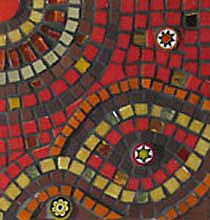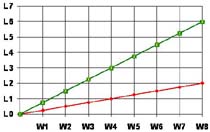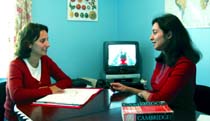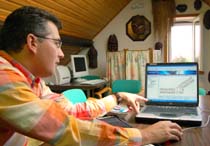| N°15 |
 |
2006/2007 |
| ONE-TO-ONE COURSES WHERE THE LANGUAGE IS SPOKEN |
||
| LEARNING A LANGUAGE IN RECORD TIME
|
||||||||||
We learn our mother tongue throughout our lives. If at 25 we have already mastered our language, it does not mean that the learning process is over. Language evolves and becomes richer, and like a sport, we need to practise it regularly to maintain our level of proficiency. It is impossible to dedicate as much time and effort to learning a new language. How can we, therefore, succeed in mastering a new language swiftly? Here is what DialoguE offers you. |
||||||||||
| MOTIVATION MOVES MOUNTAINS | ||||||||||
| Children learn their mother tongue without any conscious effort and through interaction. Few adults can adopt this approach when they learn a new language. To help you to rediscover this natural approach, DialoguE offers you its programmes within a family setting and a pleasant and non-academic environment, which is in no way reminiscent of school. Your trainers will adapt to you, to your learning style and to your personality. Once you are relaxed and motivated, you can make spectacular progress. What may seem insurmountable at first becomes easy, as if by magic. There are, however, other ways of saving time. |
 |
|||||||||
| A DYNAMIC LEARNING METHOD IN ‘MOSAIC’ | ||||||||||
 |
Traditional teaching methods are linear. Teachers usually follow a course book and teach the language as a grammatical system. They pay attention to grammatical progression and correction. They forget a fundamental point: we learn the grammar of our mother tongue after we are able to speak it. Grammar can improve our writing style, but does not improve our speaking. A language is like a mosaic, multi-facetted and complex. The tesserae of the language (word, structure, articulation) form a living and changing entity. The linear approach is radically opposed to this truth. |
|||||||||
A mosaic cannot be studied from top to bottom or from left to right. A mosaic should be explored and taken in as a whole. DialoguE invites you to explore and discover the wonderful mosaic of a language in the same way as you explore the Internet, clicking on the most interesting, useful and enriching links. |
||||||||||
| A DIALOGUE BETWEEN TWO PARTNERS | ||||||||||
As we have seen, the complexity of a language does not accommodate the linear and Cartesian approach to teaching a language that fragments its building blocks and prolongs the learning process. We need to foster the assimilation of a language as a whole rather than the acquisition of its individual constituents. Linear teaching, which is centred around grammar, is teacher driven and involves mainly a monologue. In a true dialogue, trainers do not teach; instead they accompany and facilitate. This dialogue creates a partnership: the specific skills of each dialogue partner are channeled towards the objectives that are jointly established. Only this kind of team work can lead to a great deal of progress in a short time. |
|
|||||||||
| IT IS BY COMMUNICATING THAT WE LEARN HOW TO COMMUNICATE | ||||||||||
|
A ‘communicative approach’ develops between the two dialogue partners, not based on grammar but on situations that the trainee will encounter in the target language and his/her specific needs. It is by communicating that we learn to communicate, and succeed in communicating rapidly. It is only by communicating that we can swiftly assimilate useful vocabulary and structures. Your DialoguE partner will not teach you the elements of the language in the order prescribed by course books. Your DialoguE partner will help you acquire what is most useful to you to be able to communicate effectively. To save time in learning a language, you need to develop language skills rather than a fragmented knowledge of the language. Audio visual lesson and learner in a specialised vocabulary session |
|||||||||
| COMPLETE IMMERSION: GOING A LONG WAY ON LITTLE FUEL | ||||||||||
This dynamic way of learning in ‘mosaic’ based on accomplishing tasks becomes even more efficient in a complete immersion setting. Experiencing authentic and varied situations from morning until bedtime allows you to make a great deal of progress without having to spend any additional energy. You save time by combining the ‘useful’ with the ‘enjoyable'. You also learn while you are eating, drinking and discussing fascinating subjects in the target language. Adults often believe that they can only learn consciously. We learn more in situations where we forget that we are learning. Complete immersion, like cruising down a motorway, ensures that you cover a maximum number of miles using the lowest amount of fuel. |
|
|||||||||
| When a sports enthusiast trains, he usually chooses intensive training in order to achieve a higher level of performance. DialoguE offers you this kind of intensive training in your target language. Following lessons occasionally may enable you to maintain your level. However, if you wish to make rapid progress in a week, or even a weekend, DialoguE can offer you this pleasure and this satisfaction. | ||||||||||
Adela & Manolo |
Richard van Egdominfo@dialogue.com |
Minoo & Mike
Short dialogue@angloscene.com |
||||||||
DIALOGUE IDIOMAS |
DIALOGUE TALEN |
DIALOGUE-ANGLOSCENE RYE (HASTINGS) |
||||||||
Claudine & Jean-Luc Godard info@dialogue.com |
||||||||||
DIALOGUE LANGUAGES FRENCH COURSES SPA |
DIALOGUE LANGUAGES HEAD OFFICE SPA |
|||||||||
 |
||||||||||
What you will certainly not find elsewhere
Journal
DialoguE

"ONE OF THE BEST LANGUAGE SCHOOLS"
( WALL STREET JOURNAL)




















